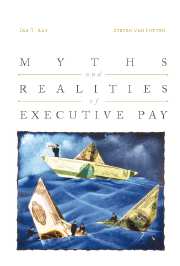Book contents
- Frontmatter
- Contents
- Acknowledgments
- Prologue: The Compensation Committee Meets
- Introduction: The Battle over Executive Compensation
- 1 The Myths and Realities of Pay-for-Performance
- 2 Managerial Power
- 3 External Pressures: The New Context for Executive Compensation
- 4 End of an Era: The Decline of the Stock Option
- 5 The Future of Long-Term Incentives
- 6 Executive Stock Ownership: The Solution to the Executive Compensation Crisis
- 7 Director Compensation in the New Environment
- 8 The Compensation Committee: Creating a Balance between Shareholders and Executives
- 9 Aligning All Employee Pay to Improve Corporate Performance
- 10 International Executive Pay Comparisons
- Conclusion: The Future of Executive Compensation
- Epilogue: Back in the Boardroom
- Appendix A Legal and Regulatory Requirements for Executive Compensation Plans
- Appendix B Summary of the Regulatory and Institutional Mandates and Recommendations
- Appendix C Academic Articles on Pay-for-Performance and the Effectiveness of the Executive Labor Market
- Notes
- Index
Introduction: The Battle over Executive Compensation
Published online by Cambridge University Press: 31 July 2009
- Frontmatter
- Contents
- Acknowledgments
- Prologue: The Compensation Committee Meets
- Introduction: The Battle over Executive Compensation
- 1 The Myths and Realities of Pay-for-Performance
- 2 Managerial Power
- 3 External Pressures: The New Context for Executive Compensation
- 4 End of an Era: The Decline of the Stock Option
- 5 The Future of Long-Term Incentives
- 6 Executive Stock Ownership: The Solution to the Executive Compensation Crisis
- 7 Director Compensation in the New Environment
- 8 The Compensation Committee: Creating a Balance between Shareholders and Executives
- 9 Aligning All Employee Pay to Improve Corporate Performance
- 10 International Executive Pay Comparisons
- Conclusion: The Future of Executive Compensation
- Epilogue: Back in the Boardroom
- Appendix A Legal and Regulatory Requirements for Executive Compensation Plans
- Appendix B Summary of the Regulatory and Institutional Mandates and Recommendations
- Appendix C Academic Articles on Pay-for-Performance and the Effectiveness of the Executive Labor Market
- Notes
- Index
Summary
Two perceptions of corporate executive pay now compete for acceptance in the United States. The first views executive compensation as a reasonably well-executed pay-for-performance model, characterized by high pay for high performance and less pay for lower performance. The successful application of this model has helped create an economic juggernaut, resulting in trillions of dollars of wealth for shareholders and substantial income and net worth for millions of corporate employees and their families. Consistent with basic microeconomic theory, high executive pay simply reflects the strong demand for top talent.
The other perception sees a failed pay-for-performance model with immorally high and rising executive pay, unrelated to corporate performance, and enormous wealth for executives who benefit from a “rising tide” in the stock market. Executives essentially set their own pay by wielding power over boards of directors that have not fulfilled their duty to balance the interests of executives with those of stakeholders. Executive pay – which has enriched management at the expense of shareholders, employees, customers, and their communities – is an embarrassment to our country and has done more economic harm than good, leading to business scandals, the demoralization of employees, and unacceptable levels of income inequality.
This second view broadly challenges the credibility of the entire corporate community. Fed most notably by a series of financial scandals, the popular press, the business press, and a group of powerful public organizations have whipped the perception of a failed pay model into a full-blown mythology of a corporate America ruled by executive greed.
- Type
- Chapter
- Information
- Myths and Realities of Executive Pay , pp. 1 - 7Publisher: Cambridge University PressPrint publication year: 2007



